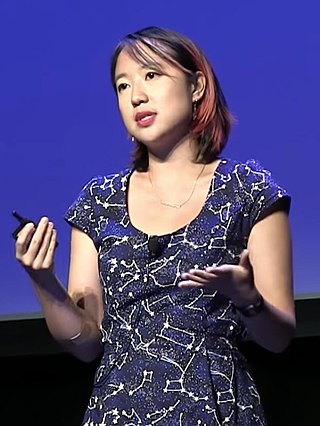Top Qs
Timeline
Chat
Perspective
Sarah Jeong
American journalist (born 1988) From Wikipedia, the free encyclopedia
Remove ads
Sarah Jeong (/dʒɒŋ/; born 1988) is an American journalist specializing in information technology law and other technology-related topics. A member of the editorial board of The New York Times from 2018 to 2019, she was formerly a senior writer for The Verge and a contributing editor for Vice Media's Motherboard website. She is the author of The Internet of Garbage, a non-fiction book about online harassment. In 2022, she rejoined The Verge as deputy features editor.
Remove ads
Early life and education
Jeong was born in South Korea in 1988.[1] When she was three years old, her parents immigrated to the United States as students and brought Sarah with them.[2] Raised as a Southern Baptist, Jeong attended a religious high school near Los Angeles. She later told Willamette Week that the Internet helped her to counter religious dogmas of her upbringing such as creation science, saying, "it's how I unbrainwashed myself".[3]
Jeong studied philosophy at the University of California, Berkeley, and received a law degree from Harvard Law School,[3] where she was editor of the Harvard Journal of Law & Gender.[4][1] She received a green card while attending college and became a naturalized U.S. citizen in 2017.[2]
Remove ads
Career
Summarize
Perspective
Jeong writes on law, technology and internet culture.[5][6] She is a former senior writer for The Verge and previously served as a contributing editor for Vice Media's Motherboard website, as well as writing articles for Forbes, The Guardian, and The New York Times.[7][8][9] From 2014 to 2015, Jeong and Electronic Frontier Foundation activist Parker Higgins published an email newsletter called "5 Useful Articles" about copyright law and the Internet.[10][11][12]
In 2015, Jeong covered the Silk Road trial for Forbes.[8][13] That same year, she published The Internet of Garbage, a non-fiction book on the threat of online harassment[14] and responses to it by media and online platforms.[15] The book discusses active moderation and community management strategies to improve online interactions.[16]
In January 2016, Jeong posted a tweet caricaturing Bernie Sanders's supporters as Bernie Bros in response to online attacks against women and Black Lives Matter advocates.[5] A campaign harassing Jeong ensued that lasted for weeks and included rape threats; it drove her to make her Twitter account private and take an unpaid leave from her job at Motherboard.[5][17]
Jeong was a Yale University Poynter Fellow in Journalism in 2016.[14][18] In 2017, she wrote about the Trump travel ban.[2] The same year, Forbes named Jeong in its "30 Under 30" list for media.[1]
In August 2018, Jeong was hired by The New York Times to join its editorial board as lead writer on technology.[18][19] The hiring sparked a strongly negative reaction in conservative media, which highlighted derogatory tweets about white people that Jeong had posted mostly in 2013 and 2014.[20][21][22] Critics characterized her tweets as being racist; Jeong released an apology,[23][24] saying that the tweets were meant to satirize online harassment toward her as a woman of color.[20][25] Editors at The Verge defended Jeong, saying that the tweets had been disingenuously taken out of context[26][24][20] and comparing the episode to the harassment of women during the Gamergate harassment campaign.[24][23]
In August 2019, Jeong left The New York Times's editorial board, becoming an opinion columnist with the newspaper.[27] In January 2022, she rejoined The Verge as the deputy features editor.[28]
Remove ads
Selected publications
- Jeong, Sarah (2017). "Dogecoin". In Maurer, Bill; Swartz, Lana (eds.). Paid: Tales of Dongles, Checks, and Other Money Stuff. Cambridge, Mass.: The MIT Press. doi:10.7551/mitpress/10489.003.0009. ISBN 978-0-262-33834-9.
See also
References
Further reading
External links
Wikiwand - on
Seamless Wikipedia browsing. On steroids.
Remove ads

